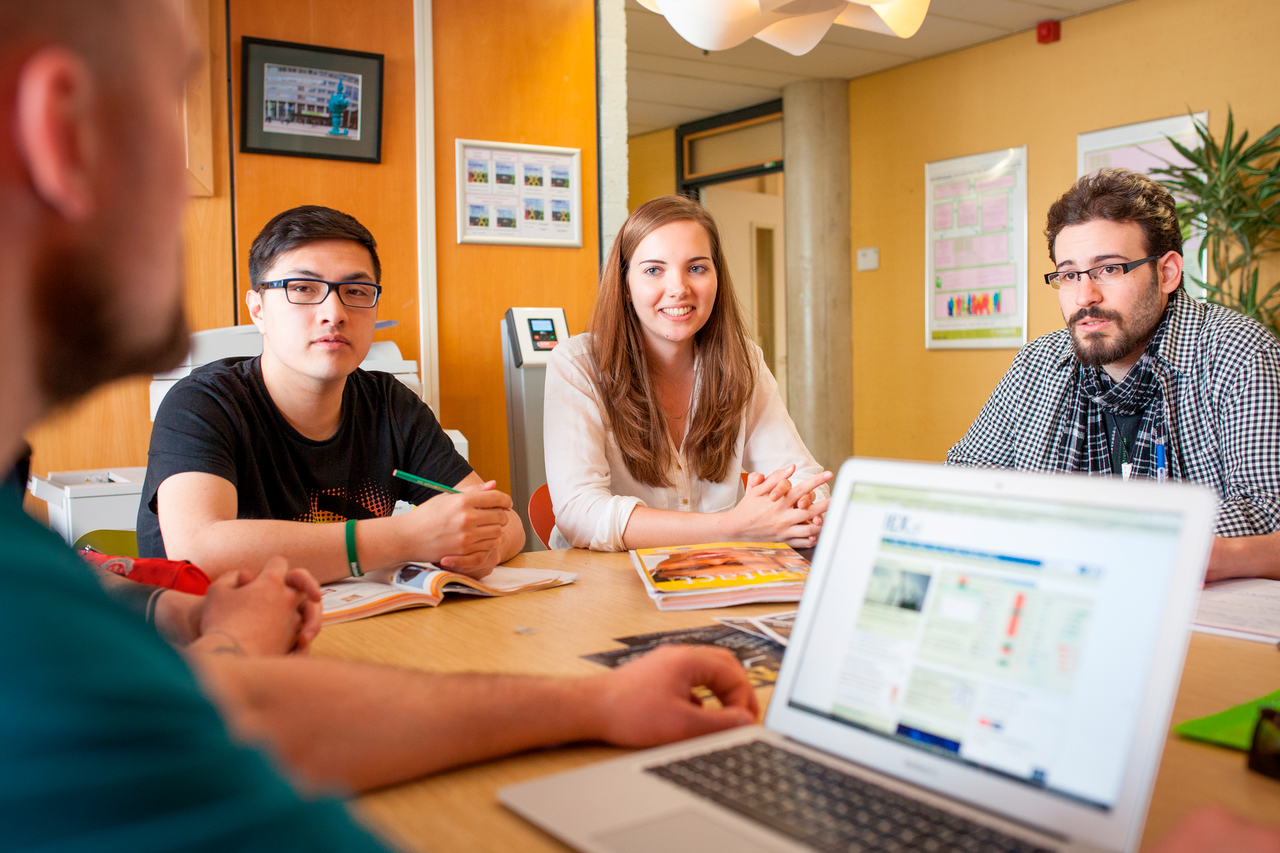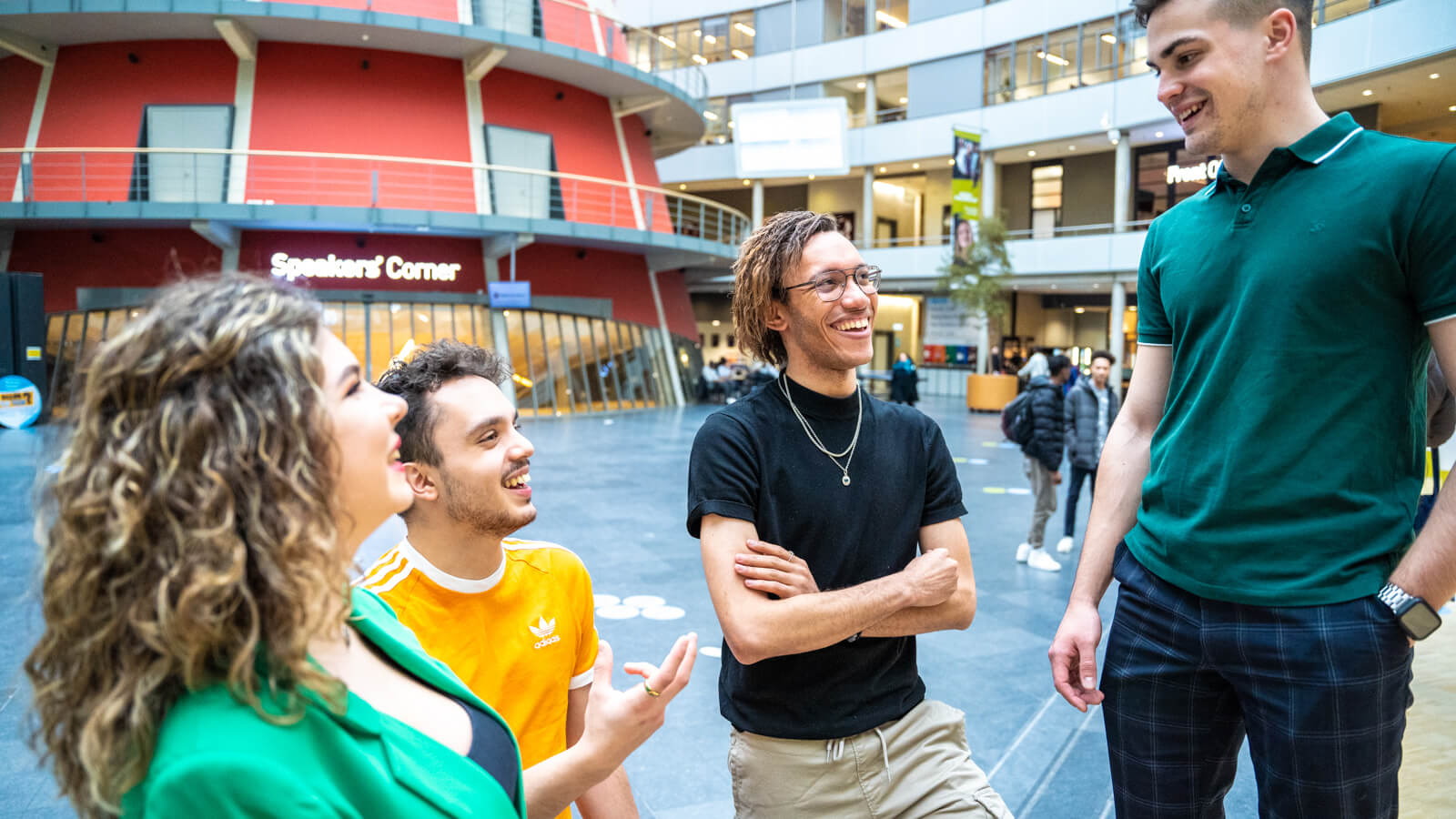For you?
How do international corporations, banks, UN bodies and multinationals make profits? How can an organization contribute to a truly global community? By taking the International Business (IB) degree you can make a difference to the world and earn a living.
We call it business + impact. Break new ground in international business management in a classroom where fellow students and lecturers come from 40+ countries. Tap into our industry contacts who’ll prepare you to step into high-flying business management and consultant jobs as a ‘manager of change’.
The IB programme will prepare you for a successful international business career. Anywhere in the world. You’ll build strong foundations in economics, marketing, sales, finance and management. Lectures and workshops in the various modules will provide you with in-depth knowledge and experience working in a global team. You’ll get to put knowledge into action during a semester-long internship at an international company.
Admission requirements
Required qualification
| Preliminary education | Required profile |
|---|---|
| Havo (senior general secondary education) |
|
| Vwo (pre-university education) |
|
| Mbo (senior secondary vocational education and training) | Level 4, middle management or specialised secondary education programme |
This programme also offers a 3-year track
If you have an academic background comparable to the Dutch VWO level, you might want to consider enrolling for the 3-year track of this degree programme instead. Check out this website.
You have a non-Dutch diploma
To enrol for the IB 4 year programme you will need a secondary school diploma comparable to a Dutch HAVO, VWO or MBO (level 4) diploma and a good command of English. Also, you need to have passed your exam in mathematics or economics or business studies.
Before we can decide on your eligibility, we’ll need to assess your secondary school certificate.
To make sure your certificate is evaluated fairly, we work with NUFFIC, an organisation that specialises in the assessment of international education qualifications.
English and mathematics are strongly recommended for MBO students. The most suitable profile for either HAVO and VWO is E&S.
Language requirements
If you were not educated in the Netherlands you usually have to submit a language test to be admitted. Depending on the type and country of your diploma you may however qualify for exemption. Please check our entry requirements page for more information.
Decisions regarding your qualification for admission
There are no exceptions to the official admission requirements. The Enrolment Office is the only party that can make decisions regarding your qualification for admission based on official regulations. You can’t rely on any other sources of information for your qualification for admission.
Programme content
What will you study each year?
Working methods
Lectures, workshops, self-study, group activities and projects
During the program you not only gain knowledge; you also learn how to develop into a business professional. Initially you will mainly receive lectures and workshops, while later you will gain more work experience with for example an internship. You also carry out a project every semester; first in groups and later individually.
Degree programme in figures
Discover THUAS
Your guide to our upcoming study-choice events
Career perspective
What will you become?
Financial Planning & Analysis
Business/Financial Controller
International Marketing Management
Business Development & Sales
Process Management
Lean and Material Flow Management
Account Management
Continue studying
There’s no need to stop your studies after graduation. Thuas Pro offers a few post graduate courses that complement the IB curriculum, such as its Master of Business Administration (MBA), Master of Financial Management and Control and Master in International Communication Management.
Specialization
We offer courses in accounting, but you’ll need a master in accounting after your bachelor to become a certified accountant. There are several options at other universities, both in and outside the Netherlands.
Testimonials from our students
Who better to tell about the degree programme than our own students? They share their experiences here. Some of them are also ready and waiting to answer any questions you may have.
Testimonials from our alumni
What lies in store after studying International Business? Our former students tell us where they ended up and how they look back on their study years.
Testimonials from our lecturers
Our lecturers make a quick introduction and tell you more about the degree programme and the classes that they teach.
Practical information
What else do you need to know?
How to apply
Your enrolment request must be submitted through Studielink. Before you do, please check the official name of the programme below. Would you like to find out more about the application process first? Check our page How to apply . The key deadlines are listed here as well. This degree programme starts in September and there is no intake in February.
Tuition fee
You will have to pay tuition fees when you enrol on a bachelor's programme. You can pay in one or more instalments. If you pay in more than one instalment a small administration fee is charged.
More information about tuition fees
Scholarships
Find out more about scholarships for international students. Please note that these scholarships are one-off scholarships only, meaning that if you obtain them it is only for your first year of study.
Student finance
Dutch students qualify for extra financial support via a loan. Dutch students automatically qualify for this financial assistance and international students may be eligible if they have lived in the Netherlands for at least five years or are employed for at least 56 hours per month.
Additional Costs
You must also budget for books, excursions and field trips. You can expect to pay approximately €800 per year to cover these additional costs. During your semester abroad, you will also need to pay for tickets, housing and insurance.
Visa and residence permit
Help in choosing your study
We would like to help you make the right decision
It takes a bit of thought and research to find the right programme. The Hague University of Applied Sciences organizes various activities throughout the year to give you the best possible idea of the various studies offered. You also learn what it’s like to study at THUAS. This way, you can click on the registration button without a doubt in mind. Or you’ll know for certain it’s not right for you.
Walk in at our Study & Career Centre for…
Assistance during your studies
Mentoring, coaching and advice
As an IB student you’ll be paired with a mentor to support your personal and professional development on and off campus. In year one, your mentor can act as a sounding board and help you settle in as you leave home and get used to an international classroom and the Dutch culture. Later on, mentors can support your academic growth, help you face any challenges and be on hand during semesters abroad and internships.
For more information about student counsellors/student psychologists, high-performance sports, Dutch language support or studying with a functional disability, go to our page about support during your studies.
Official details of the programme
This degree programme is registered in Registration of Institutions and Programmes (RIO):
- Official Dutch name of degree programme: International Business
- Official international name: International Business
- Programme code (Isat): 30029
- Institution code (Brin): 27UM
Both the official Dutch and the official international name of the degree programme (current at the time of your graduation) will be printed on your diploma.
For more information on the accreditation of this degree programme, see the Accreditation Organisation of the Netherlands and Flanders (NVAO) website.
Looking for a different degree programme?
You might find these programmes interesting too!



